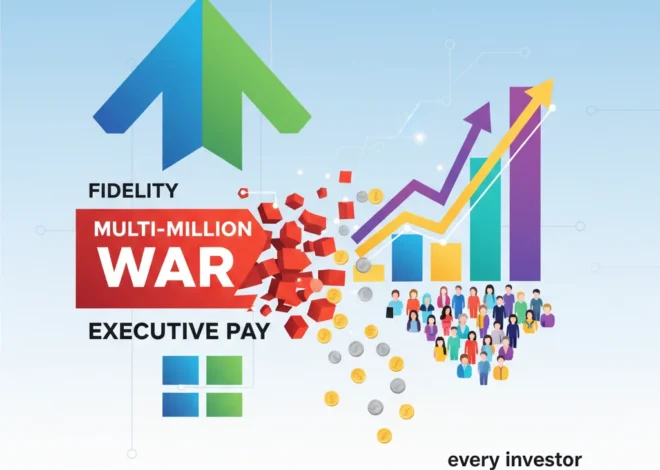The $56 Billion Mandate: Unpacking Elon Musk’s Historic Pay Victory and What It Means for Modern Investing
A Shareholder Showdown of Epic Proportions
In the world of corporate finance, few events capture the global imagination like a high-stakes battle involving Elon Musk. The recent Tesla shareholder meeting was no exception. In a resounding decision that reverberated through the stock market, investors voted to re-approve Elon Musk’s colossal 2018 pay package, a compensation plan once valued at up to $56 billion. This wasn’t just a rubber stamp on a CEO’s salary; it was a dramatic referendum on Musk’s leadership, a challenge to legal precedent, and a fascinating case study in the evolving dynamics of corporate governance and modern investing.
The victory, secured with approximately 75% of the vote (excluding shares held by Musk and his brother, Kimbal), represents a powerful mandate from the very people who own the company. However, the story is far more complex than a simple vote count. It’s a saga involving audacious goals, a landmark court battle, and a glimpse into the future of shareholder power in an era dominated by financial technology and retail trading. To truly understand the implications for the economy and your own investment strategies, we must dissect how we got here and where this unprecedented decision leads next.
The Genesis of a ‘Moonshot’ Compensation Plan
To grasp the significance of the 2024 vote, we must travel back to 2018. At the time, Tesla was a far riskier bet than the automotive giant it is today. To incentivize its visionary but famously distractible CEO, the board crafted a revolutionary “pay-for-performance” package. The plan was audacious: Musk would receive zero salary or cash bonuses. Instead, his entire compensation would be tied to hitting a series of extraordinarily ambitious milestones over a decade.
The package consisted of 12 tranches of stock options, each vesting only if Tesla achieved specific, escalating targets for both market capitalization and operational performance (either revenue or adjusted EBITDA). The ultimate goal was to grow Tesla’s market cap from around $50 billion to a staggering $650 billion—a feat many analysts at the time deemed impossible. Yet, under Musk’s leadership, Tesla shattered every single one of these targets, achieving the final milestone years ahead of schedule. This remarkable performance is what unlocked the full value of the package, making it the largest in U.S. corporate history.
The Quantum Leap: Why Today's Financial Markets Are on the Brink of a Sci-Fi Revolution
The Delaware Detour: A Legal Rebuke
Just as Musk was poised to reap the rewards of this unprecedented growth, the entire agreement was thrown into jeopardy. A lawsuit brought by a small shareholder led to a stunning ruling in January 2024. A Delaware Court of Chancery judge, Chancellor Kathaleen McCormick, voided the entire $56 billion package. The court’s decision wasn’t about the amount of money; it was about the process. The judge ruled that the 2018 approval process was “deeply flawed” because Musk, due to his influence and close ties with board members, effectively controlled the negotiations. The court argued that shareholders were not fully informed of the board’s lack of independence, rendering their initial approval invalid (source).
This legal bombshell created massive uncertainty. It not only clawed back Musk’s compensation but also raised fundamental questions about corporate law and the sanctity of shareholder agreements. In response, Tesla’s board took a bold and unconventional step: they decided to put the same 2018 pay package up for a new vote, effectively asking shareholders to ratify their original decision and send a clear message back to the legal system.
The Campaign for Ratification: A Battle for Hearts and Minds
The run-up to the June 2024 shareholder meeting was a full-blown campaign. Tesla’s board, led by Chair Robyn Denholm, argued that fairness demanded honoring the 2018 agreement. They framed the vote as crucial for retaining Musk’s focus, emphasizing the “key person risk” associated with a CEO who also runs SpaceX, X (formerly Twitter), Neuralink, and The Boring Company. Their core message was simple: a promise is a promise, and Musk delivered on his end of the bargain.
However, the opposition was formidable. Major proxy advisory firms, which guide the voting of large institutional investors, stood against the package. Institutional Shareholder Services (ISS) and Glass Lewis both recommended a “no” vote, citing the excessive size of the award and lingering governance concerns (source). This created a clear divide in the world of finance.
Below is a summary of the competing arguments that defined this high-stakes debate in economics and corporate strategy.
| Arguments FOR the Pay Package | Arguments AGAINST the Pay Package |
|---|---|
| Honoring a Contract: Musk met and exceeded all incredibly difficult performance targets. The deal should be honored. | Excessive Quantum: The award’s size is unprecedented and dilutive to shareholders, far exceeding compensation norms. |
| Retaining Talent: The package is essential to keep Musk motivated and focused on Tesla amidst his other ventures. | Flawed Process: The original 2018 approval process was compromised by Musk’s influence over the board, as ruled by the court. |
| Shareholder Democracy: Investors, not courts, should decide CEO compensation, especially when it’s tied to performance. | Poor Corporate Governance: Re-approving the package ignores the court’s findings and sets a bad precedent for board oversight. |
| Value Creation: The plan directly led to over $700 billion in shareholder value creation, making the payout a fair reward. | Musk is Already Motivated: His significant existing stake in Tesla is already a powerful incentive to perform. |
The Knotweed of Finance: Is Cryptocurrency an Invasive Species in Your Portfolio?
Broader Implications for the Stock Market and Corporate Finance
While the vote is a personal victory for Elon Musk, its shockwaves extend far beyond Tesla. This event serves as a critical data point for several key trends shaping the future of the stock market and the broader economy.
1. The Rise of the Retail Investor: This vote was a powerful demonstration of the influence wielded by individual investors. Enabled by fintech platforms that simplify trading and shareholder voting, the retail base proved it could act as a counterweight to the recommendations of institutional giants. This trend is reshaping how public companies engage with their shareholders.
2. Redefining CEO Compensation: The Tesla model, while extreme, could inspire more boards to experiment with all-or-nothing, performance-based stock awards. This approach to executive compensation aligns leadership directly with shareholder interests, a core principle of modern finance. However, it also raises questions about the sheer scale of such rewards and their potential to exacerbate wealth inequality.
3. The Future of Corporate Law: The decision puts Tesla’s legal team in a much stronger position as they appeal the Delaware court’s ruling. The argument that shareholders were harmed is significantly weakened when those same shareholders have now voted—twice—in favor of the plan. This could lead to a landmark legal battle that re-examines the balance of power between the judiciary and shareholders in corporate matters, potentially impacting corporate law across the United States.
4. Impact on the Banking and Financial Technology Sectors: The mobilization of shareholders for this vote showcases the power of modern communication and financial technology. Brokerage platforms and investor relations firms will likely invest more in tools that facilitate direct engagement, analysis, and voting, further empowering investors and changing the landscape of corporate banking and advisory services.
From a Reader's Plea to a Financial Mandate: The Economics of Climate Inaction
What Lies Ahead? The Road from Austin to Delaware
Despite the celebratory mood at the shareholder meeting, the fight is not over. The shareholder vote does not automatically reverse the court’s decision. Instead, it serves as powerful new evidence for Tesla’s appeal. The company will argue that the ratification demonstrates unequivocal shareholder support, curing any procedural defects from the 2018 process. Legal experts are divided on whether this will be enough to sway the Delaware courts, which place a heavy emphasis on proper process over outcomes.
Simultaneously, shareholders also approved another key proposal: moving Tesla’s state of incorporation from Delaware to Texas. This strategic move is a direct response to the unfavorable legal ruling and is intended to shield the company from what Musk perceives as judicial overreach in Delaware, long the preferred home for America’s largest corporations. This corporate “re-domestication” is a significant event in its own right, with long-term implications for the company’s legal and regulatory environment.
Conclusion: A New Chapter in Corporate History
The re-approval of Elon Musk’s pay package is more than just a headline about a billionaire’s paycheck. It is a landmark event that sits at the intersection of law, finance, and technology. It reflects a fundamental debate about value creation, corporate control, and the very definition of fair compensation. For investors, business leaders, and students of economics, it offers a powerful lesson: in the 21st-century economy, the old rules of corporate governance are being challenged by the direct, amplified voice of shareholders and the undeniable influence of visionary, larger-than-life leaders. The final chapter of this saga will be written in the courtroom, but its impact on the stock market and corporate strategy is already being felt.


